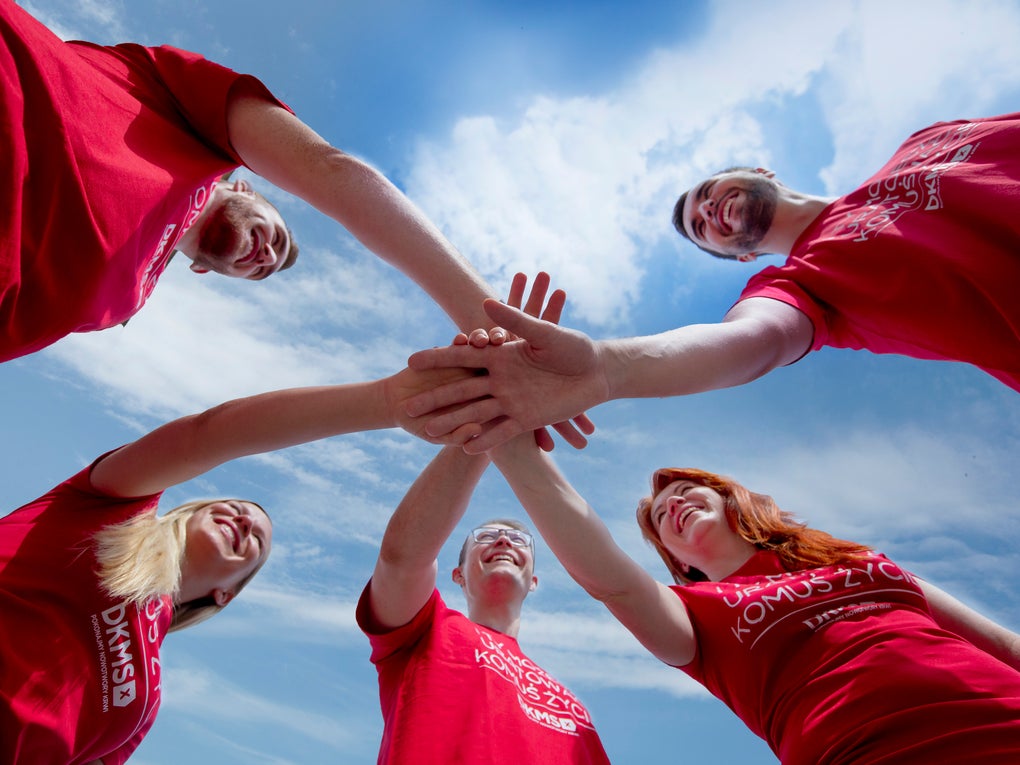
Registration Summary
Summary
The following summarises the basic information for those wishing to join the DKMS donor register. Further information is given in DKMS literature and on our website .
- By joining the DKMS donor register, anonymised data about your tissue type can be matched by healthcare professionals to patients around the world.
- To join, you must provide a tissue sample (normally a mouth swab) which will be analysed by a DKMS accredited laboratory primarily for its specific ‘tissue type’ characteristics. Only this medical ‘profile’ will then be listed on the register. No personally identifiable information about you will be shared on the register.
- It is rare to find matching donors, so you may never be matched at all. Around 1% of our listed donors will be asked to donate for a patient in the next 10 years.
- You will stay on the register until your 61st birthday. You can withdraw at any time.
Who can register as a blood stem cell donor?
Any healthy adult living in the UK and between the ages of 18 and 55 can become a potential blood stem cell donor. Pre-registration is possible from the age of 17. If you have or previously had a chronic or serious condition, or take any medications regularly, please discuss this with a member of the DKMS team for initial guidance.
Exclusion criteria:
You will not be able to register if you have any of the following:
Obesity (i.e. body mass index (BMI) >40)
Severe heart, lung or kidney conditions
Severe conditions of the central nervous system
Mental health conditions
Severe metabolic conditions
Addictions (alcohol, drugs, tablets)
Severe tropical infectious conditions
Infectious conditions like HIV, Hepatitis B or
Hepatitis C, Syphilis
Systemic autoimmune conditions or other severe
chronic illnesses (e.g. diabetes or rheumatism)
Cancer (including being cancer-free, but having had cancer in the past)
Conditions of the haematopoietic system (blood disorders)
If a potential blood stem cell match is identified
Please note that at this point you are only agreeing to registration. If a potential donor is found further information will be provided, you will have the opportunity to ask questions and to withdraw at any time until an actual donation is scheduled.
The following is a brief overview of the next steps:
- We will approach you for ‘confirmatory typing’ – this involves a visit to a GP where a blood sample will be taken for further analysis. The blood sample will be tested to confirm your HLA type and tests will be run for certain infectious diseases including HIV, hepatitis B and C, and syphilis.
- Only IF the confirmatory typing and assessment determines a donor is suitable will a stem cell collection be considered. In this case DKMS and/or a licensed healthcare provider may arrange for you to visit a clinic where the full procedure will be explained in detail and further tests will be undertaken to make sure that a donation would be safe for you and the recipient.
- If you are a suitable donor, you will be asked to donate in one of two ways. You should be willing to donate using either method:
Peripheral Blood Stem Cell Donation
Stem cells are collected via the blood stream. To increase the number of cells in the blood stream, for four consecutive days prior to the collection, donors receive a daily injection to stimulate stem cell production (G-CSF). On the day of donation, the donor’s blood is collected and passed through a machine that separates the stem cells (apheresis). The remaining blood is returned to the donor. This is a non-surgical outpatient procedure that takes around four hours. 90% of the donations are given by this method. Further information about peripheral blood stem cell collection can be found here.
Bone Marrow Donation
Marrow cells are collected from the hip bone. This is a 1-2 hour inpatient procedure under general anaesthetic. 10% of the donations are given by this method. You can find out more about bone marrow donation here.
Neither you nor the patient will know the identity of the other. Sometime after donation, contact may be possible in certain cases with your consent. This will be discussed in detail if a potential match is identified.
For more information about the donation process, please visit our Donation Explained page.